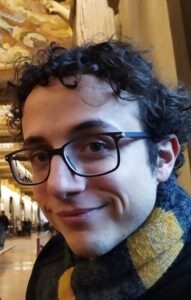 Four ESRs in the MOSAICS project, and four “Meet the ESRs” posts. And since last time was about ESR 3: Nikki Tromp, is it really a surprise who this post is going to be about?
Four ESRs in the MOSAICS project, and four “Meet the ESRs” posts. And since last time was about ESR 3: Nikki Tromp, is it really a surprise who this post is going to be about?
That’s right, this is about ESR 4: Enrico Migliorini, who is looking into Artificial Intelligence and its role into innovating the fitting process. In the following paragraphs you will find some insight about this researcher and his project.
How did you get into the field of Cochlear Implants? When I was 10, one of my sisters, profoundly deaf since birth, was implanted with a CI. This allowed me to witness first-hand the tremendous impact that these devices have on a recipient. Later on, during my Master’s Degree, I started reading books about Transhumanism, the philosophical concept of transcending humanity through the use of technology, and this led to me taking some classes in Neuroengineering; after graduating I sought opportunities in the field until I found this outstanding PhD opportunity with MOSAICS.
What are your aspirations for your research? For every time that we hear about machine learning tools outperforming humans, there are many more cases of those tools not being actively used, as humans don’t take kindly to being made obsolete. My aspiration is to create tools that, rather than trying to replace clinicians, will assist them by working side-by-side, so that they may actually be used.
Enrico’s 15 second #MyJobInResearch video.
Humans don't take kindly to being made obsolete. My aspiration is to create tools that may actually be used.
How is the MOSAICS European Industrial Doctorate (EID) experience compared to your previous ones in academia and/or industry? My previous experience in academia was during my Master’s Thesis, and the EID is extremely different. I am receiving a tremendous amount of guidance, training, and direction instead of just being given a task, a computer and three months time. I am extremely glad that the objective is to form us and develop our skills.
What is your favorite physical activity? Fencing, specifically Historical European Martial Arts with sideswords or smallswords. I love the challenge of a duel and the precision of movements that it requires. Also, it makes for a fantastic conversation starter: “How did you get that black eye?” “Ah, I was in a swordfight.”
What do you think you bring to the MOSAICS team besides your expertise? I’m a good cook, that must count for something, right? Other than that, I try to be someone who can bring people’s morale up, as well as an eclectic person who can assist others with many different things, whether someone needs a Python script, the recipe for Ribollita or a list of Renaissance masterpieces.
What is the most important quality you consider a researcher should have? It’s bizarre how a researcher needs both pride and humility: we require confidence almost to the point of hubris telling us that we can change the world, so that we create something that we can display proudly. On the other hand, when dealing with our actual projects, we need to be humble, checking for errors and asking for help before we make wild claims. I would say that this oxymoronic pair is the most important, as without any pride we would not be driven, and without humility we would be arrogant.
Without any pride we would not be driven, and without humility we would be arrogant.
Do you see advantages the EID could bring to a young researcher as yourself? Definitely! Not only is it, like other group projects, a great way to tackle problems from a multidisciplinary approach and learn a lot from fellow researchers, but being both in industry and academia we can explore the two main worlds of research, so that we can decide which one will fit better our future.
What is your favorite memory during MOSAICS so far? During one of the early trainings, before COVID, we all had dinner at my house in Mechelen. I did not yet have furniture out, so we ate homemade pizza sitting on pillows, using a box as a table. Ignacio was playing my guitar; it was just a lovely moment. Hopefully we will have other similar moments soon.
What would you bring on a desert island? Food, water, carpentry tools and a satellite phone to ask for rescue.
What’s your favorite book/music? For books, I have to go with Terry Pratchett’s Discworld series. Nothing else can make me laugh wildly while also contemplating the human condition and the value of kindness and compassion. Musically, I listen to a lot of different genres but if I have to pick a favorite, then it has to be Mozart’s Die Zauberflöte. It just feels like the most heavenly music to ever grace the planet.
